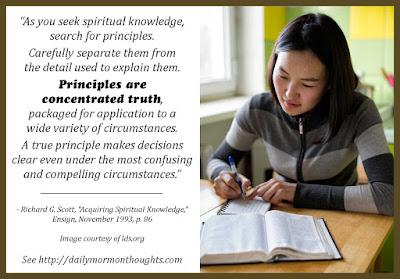"Stated succinctly, a gospel principle is a doctrinally based guideline for the righteous exercise of moral agency. Principles derive from broader gospel truths and provide direction and standards as we press forward on the covenant path...."Learning, understanding, and living gospel principles strengthen our faith in the Savior, deepen our devotion to Him, and invite a multitude of blessings and spiritual gifts into our lives. Principles of righteousness also help us to look beyond our personal preferences and self-centered desires by providing the precious perspective of eternal truth as we navigate the different circumstances, challenges, decisions, and experiences of mortality...."Gospel principles are for me and you what a helm is to a ship. Correct principles enable us to find our way and to stand firm, steadfast, and immovable so we do not lose our balance and fall in the raging latter-day storms of darkness and confusion."- David A. Bednar, "The Principles of My Gospel," General Conference April 2021, Sunday afternoon
In this talk during the April 2021 General Conference, Elder Bednar reviewed one of the crucial aspects of the Gospel: the distinction between doctrines, principles, and guidelines. He described the critical importance of learning, understanding, and living the principles, and benefits that come from doing so:
- Joseph Smith, the fundamental message about how he would "teach... correct principles and let [the church members] govern themselves."
- Dallin H. Oaks and his illustrative messages about how principles apply to Aaronic Priesthood duties.
- Russell M. Nelson's recent insights about both the "sign" we give to God as we respect the Sabbath, and the concept from the last conference of letting God prevail in our lives.
It's always very worthwhile to ponder what the guiding principles are in our lives, especially the doctrinally-based ones. The more we understand about the principle itself and the doctrine underlying it, the more power we will find in obeying and following.
(Compilation and commentary by David Kenison, Orem, Utah, 2020)












